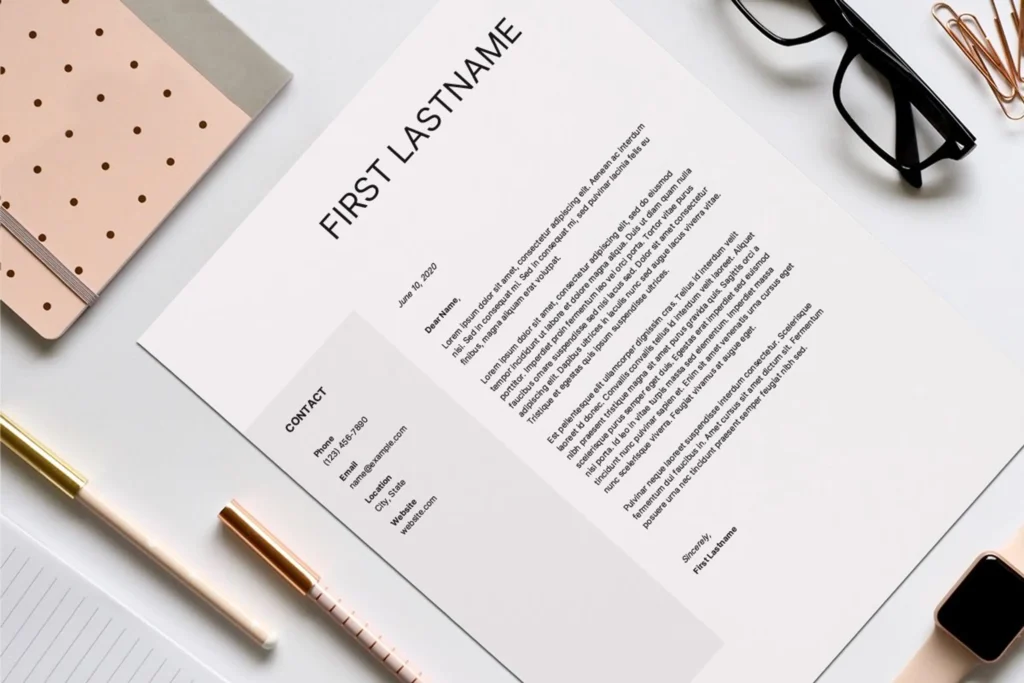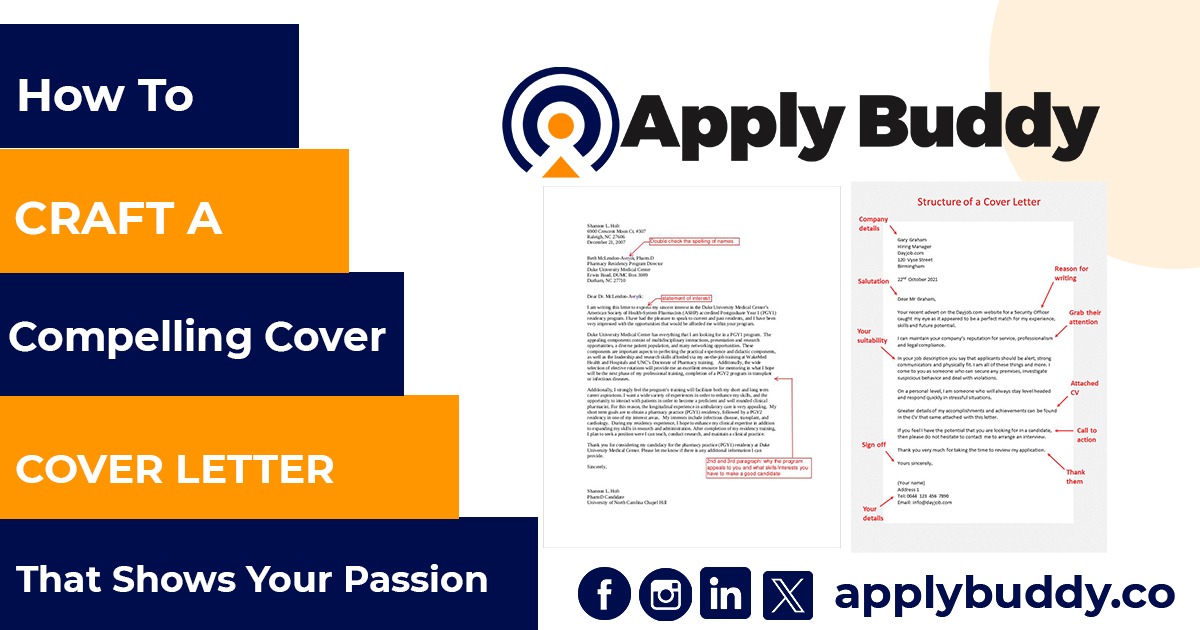Have you mastered the art of tailoring your cover letter to reflect your passion accurately? Regardless of your answer, you must be willing to keep learning and improving to stand out in the job market. How to craft a compelling cover letter that shows your passion is crucial to landing your next role. Reports show that most hiring managers (94%) think cover letters are influential when deciding who to interview. Large companies with massive applications use cover letters to sift through applicants.
You need to understand that a cover letter is more than just a formal introduction; it’s your chance to connect personally with the hiring manager and convey your enthusiasm for the role in just a few words. Unlike a resume listing your qualifications and experience, a cover letter allows you to share your story, highlight your unique strengths, and explain why you’re the ideal candidate. When crafted thoughtfully, it can be a powerful tool in your job search, showing what you’ve done, who you are and what drives you.
See Also: How to Send a Thank You Note that Leaves a Lasting Impression
Why a Cover Letter Is Your Chance to Showcase Passion and Fit

Your cover letter is your first impression of a potential employer, and it’s a prime opportunity to showcase your passion for the role and the company. While your resume outlines your skills and experience, your cover letter allows you to delve into why you are passionate about the industry, the company, and the specific position. It’s your chance to align your personal values and career goals with the company’s mission and culture, making a compelling case for why you are the perfect fit.
Start by researching the company and understanding its core values, mission, and recent achievements. Reference these in your cover letter to show that you’re not just looking for any job—you’re looking for this job at this company. Express genuine enthusiasm for the role and explain how your background, skills, and passions align with what they seek. Remember, hiring managers are not just looking for someone who can do the job; they want someone excited about doing it with them.
How to Research a Company to Tailor Your Cover Letter
Tailoring your cover letter to the company you’re applying to is crucial in demonstrating that you’ve done your homework and are genuinely interested in the role. Using the information you gather, you can tailor your cover letter to reflect your understanding of the company’s challenges and how your unique skills and passions make you the right person to help address them. Here’s how to effectively research a company to make your cover letter stand out:
- Start with the Company Website: Visit its official website to gather information about its history, mission, and values. Pay close attention to the “About Us” page and any recent news or press releases. This will give you insight into the company’s values and how you can align your values and goals with theirs.
- Check Out Their Social Media: Companies often share updates, achievements, and culture highlights on platforms like LinkedIn, Twitter, and Facebook. Reviewing these posts can give you a more personal view of the company’s culture and recent developments.
- Read Industry News and Reviews: Understanding the company’s position within its industry can help you show how your skills and experience can help them achieve their goals. Sites like Glassdoor or Indeed can also provide insights from current or past employees about the company’s culture.
- Network with Current or Former Employees: If possible, connect with someone who works or has worked at the company. They can offer insider perspectives you won’t find online and help you better understand the company’s needs.
See Also: How to Boost Your Chances of Getting an Interview
The Ideal Cover Letter Structure to Capture Attention
Knowing how to craft a compelling cover letter that shows your passion largely relies on how you structure your message. By following this structure, you ensure that your cover letter is clear, focused, and compelling, making it easier for the hiring manager to see why you’re the best candidate. Here’s an ideal structure to help you capture and maintain the hiring manager’s attention:
- Opening Paragraph: Start with a strong opening that immediately grabs attention. Mention the specific role you’re applying for and where you found the job listing, and briefly state why you’re excited about the opportunity.
- Second Paragraph: Highlight your relevant experience and skills. Rather than just listing your qualifications, tie them directly to the job description and the company’s needs. This is where you begin to make the case for why you’re the perfect fit.
- Third Paragraph: This is where you can showcase your passion. Use personal stories or examples that illustrate your enthusiasm for the industry or the company. Demonstrate how your values align with the company’s mission and that your career goals fit the role.
- Fourth Paragraph: Address any additional qualifications or skills that make you a unique candidate. This could include specific software proficiencies, certifications, or soft skills aligning with the company’s culture.
- Closing Paragraph: End strongly by reiterating your enthusiasm for the role and expressing your eagerness to discuss how you can contribute to the company’s success. Thank the hiring manager for their time and consideration, and make sure to include a call to action, such as a request for an interview.
How to Use Personal Stories to Show Passion in Your Cover Letter
Personal stories can be a powerful tool in your cover letter, allowing you to connect with the hiring manager more personally. Personal stories make your cover letter more memorable and help hiring managers see you as a passionate, motivated candidate genuinely interested in the role. When you share a story, you’re not just telling them what you can do—you’re showing them who you are. Here’s how to effectively incorporate personal stories into your cover letter:
- Choose Relevant Stories: Select a story that highlights your passion for the industry or the role; you can then research how to craft a compelling cover letter that shows your passion based on your findings. It could be a moment when you realized your career path, a project that you were deeply invested in, or an experience that aligns with the company’s mission.
- Be Specific and Concise: Your story should be straightforward and to the point. Focus on the details, such as the situation, how you were involved, and the outcome. This keeps your cover letter concise and ensures your story has a clear takeaway.
- Showcase Your Passion: Use your story to demonstrate your enthusiasm and commitment. For example, if you’re passionate about sustainability, you might share how you led an initiative at a previous job to reduce waste and its impact on the company’s operations.
- Tie It Back to the Role: Always connect your story to the position you’re applying for. Explain how the experience you’ve shared makes you uniquely qualified for the role and how it aligns with the company’s values or goals.
See Also: Let Your CV and Cover Letter Speak for You
How to Show That Your Skills and Achievements Align With The Job Requirements

By directly addressing the job requirements and illustrating your relevant skills and achievements, you make it clear to the hiring manager that you’re a well-qualified candidate ready to hit the ground running. To effectively show that your skills and achievements align with the job requirements, you must carefully analyse the job description and tailor your cover letter accordingly. Here’s how to do it:
- Identify Key Requirements: Start by carefully reading the job description and highlighting the essential skills, qualifications, and experiences the employer seeks. Pay attention to hard skills (e.g., technical abilities, certifications) and soft skills (e.g., communication, teamwork).
- Match Your Experience: For each key requirement, find an example from your experience demonstrating how you meet or exceed that requirement. For instance, if the job requires project management experience, you might discuss a project you led, including specific details such as the team size, budget, and outcome.
- Quantify Your Achievements: Whenever possible, use numbers to quantify your achievements. For example, instead of saying, “I improved sales,” you could say, “I increased sales by 20% over six months.” Quantifying your achievements makes them more tangible and impressive to potential employers.
- Highlight Relevant Skills: Focus on the skills most relevant to the job, even if they’re not explicitly mentioned in the job description. For example, if you’re applying for a customer service role, emphasize your problem-solving skills, empathy, and ability to handle difficult situations calmly.
- Use Keywords: Incorporate keywords from the job description into your cover letter. This shows that you’ve read and understood the job posting and helps your cover letter get noticed by Applicant Tracking Systems (ATS), which scans for specific terms.
See Also: Best Cover Letter Writing Service
How to Communicate Genuine Enthusiasm in Your Cover Letter
Communicating genuine enthusiasm in your cover letter is critical to making a solid impression. You need to showcase your individuality and a good dose of positivity. Here are some strategies to ensure your enthusiasm shines through:
- Express Specific Interest: Instead of generic phrases like “I’m excited about this opportunity,” specify what excites you about the role or the company. For example, you could say, “I’m thrilled about the opportunity to work at a company leading the industry in innovative technology solutions.”
- Use Positive Language: Your choice of words can convey enthusiasm. Use positive, upbeat language throughout your cover letter. Phrases like “I’m eager to contribute,” “I’m passionate about,” and “I look forward to” help create a positive tone.
- Be Authentic: Authenticity is crucial. Don’t try to force enthusiasm where it doesn’t naturally exist. Be honest about why you’re excited about the role and how it aligns with your career goals.
- Connect with the Company’s Mission: Show that you’re interested in the job and the company’s mission and values. If the company is committed to sustainability, for example, share why that’s important to you and how it aligns with your values.
- Include a Strong Closing: End your cover letter with a strong closing, reiterating your enthusiasm. For example, you might say, “I’m excited about the possibility of contributing to your team and am eager to discuss how my background and skills align with the goals of [Company Name].”
Tips to End Your Cover Letter on a Positive and Memorable Note

Ending your cover letter on a strong note is just as important as crafting a compelling opening. The conclusion should leave a lasting impression and encourage the hiring manager to take the next step. A firm conclusion can reinforce your passion and suitability for the role, making your cover letter both positive and memorable. Here’s how to wrap up your cover letter effectively:
- Reiterate Your Interest: Briefly restate your enthusiasm for the role and the company. This reinforces your genuine interest and shows that you’re eager to contribute.
- Call to Action: Encourage the hiring manager to take action, such as scheduling an interview. For example, you might write, “I look forward to the opportunity to discuss how my skills and experiences align with the needs of your team.”
- Express Gratitude: Thank the hiring manager for considering your application. A simple “Thank you for your time and consideration” adds a polite and professional touch.
- Keep It Concise: Your closing should be brief and to the point. Avoid repeating information from earlier in the letter; instead, focus on leaving a positive final impression.
- Use a Professional Closing: End with a professional sign-off, such as “Sincerely,” “Best regards,” or “Yours truly,” followed by your full name.
Common Cover Letter Mistakes to Avoid
Even a well-written cover letter can be undermined by common mistakes. Avoiding these common pitfalls will help you create a cover letter that is polished, professional, and impactful. Mastering how to craft a compelling cover letter that shows your passion is also a product of attention to detail. Here’s what to watch out for:
- Being Too Generic: Avoid using a one-size-fits-all cover letter. Tailor each cover letter to the specific job and company to show that you’ve done your research and are genuinely interested.
- Repeating Your Resume: Your cover letter should complement, not duplicate, your resume. Use it to highlight essential experiences and skills directly related to the job.
- Focusing Too Much on Yourself: While showcasing your qualifications is essential, remember to focus on how you can add value to the company. Use language that emphasizes what you can offer rather than what you want.
- Overloading with Information: Keep your cover letter concise. Hiring managers are busy and appreciate a letter that gets to the point. Aim for no more than one page.
- Ignoring Formatting and Typos: Poor formatting or typos can make a wrong impression. Ensure your cover letter is well-organized and free of spelling and grammatical errors.
- Failing to Include a Call to Action: Don’t leave the hiring manager wondering what to do next. Include a call to action that encourages them to invite you for an interview.
See Also: How to Write an ATS-Friendly CV
Conclusion
Learning how to craft a compelling cover letter that shows your passion and fit for the role is essential to the job application process. By carefully researching the company, tailoring your cover letter to the job description, and infusing your writing with genuine enthusiasm, you can create a powerful document that captures the attention of hiring managers. Remember to use personal stories to illustrate your passion, align your skills and achievements with the job requirements, and avoid common mistakes. With these tips, you’ll be well on your way to crafting a cover letter that stands out and lands you an interview.
ApplyBuddy: Your Solution to Crafting Compelling Cover Letters
In today’s competitive job market, crafting a cover letter that truly stands out is more important than ever. Many job seekers struggle to find the right balance between professionalism and genuine expression. This is where ApplyBuddy steps in.
ApplyBuddy is designed to help you remove the stress of job applications, craft cover letters specifically for your target jobs, and ensure uniqueness and robust fit for every job application. Applybuddy ensures that your cover letters not only meet the job’s technical requirements but also resonate with hiring managers on a personal level. With our expert guidance, you’ll learn how to tailor your cover letter to specific companies, use personal stories to highlight your passion and avoid common mistakes that can undermine your application. By using ApplyBuddy, you can confidently submit cover letters that leave a lasting impression, increasing your chances of landing the job you desire. If you want to take your place in the celebration of success stories, then start today.
FAQs
- How can I show passion in my cover letter without sounding too emotional?
To show passion without sounding overly emotional, focus on specific examples and experiences demonstrating enthusiasm. Use positive language and express why you’re genuinely excited about the role and the company, but maintain a professional tone throughout. - What if I’m passionate about the company but lack experience in the role?
If you lack direct experience, highlight transferable skills and experiences that make you a strong candidate. Emphasize your willingness to learn and adapt, and explain why your passion for the company drives your desire to contribute to its success. - How long should a compelling cover letter be?
A compelling cover letter should be concise, typically no longer than one page. Aim for 300-400 words, focusing on key points showcasing your qualifications and enthusiasm for the role. - Should I address my cover letter to a specific person or use a general salutation?
Address your cover letter to a specific person, such as the hiring manager, whenever possible. This shows that you’ve taken the time to research the company. If you can’t find a specific name, use a professional salutation like “Dear Hiring Manager.”





